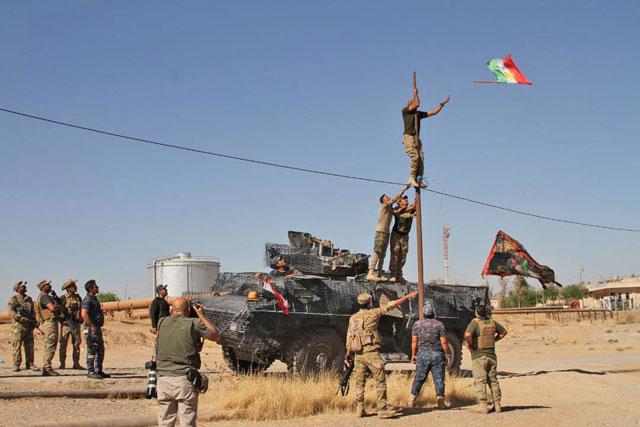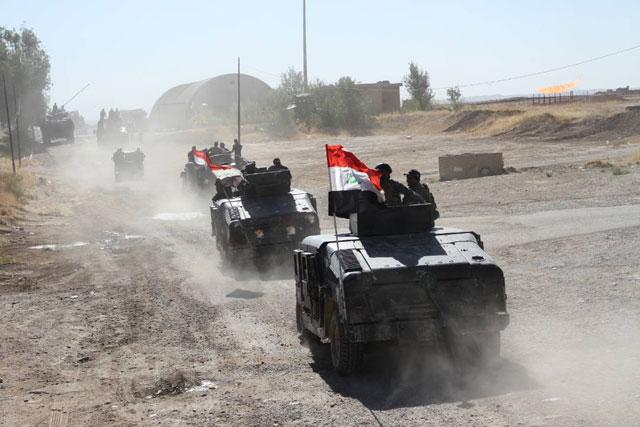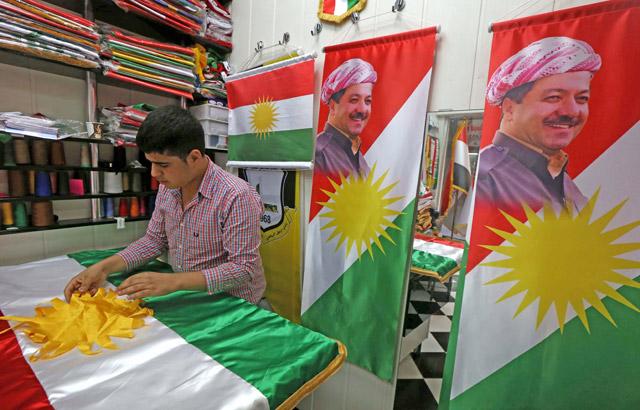You are here
Clashes as Iraqi army takes last Kurd-held area of Kirkuk province
By AFP - Oct 21,2017 - Last updated at Oct 21,2017

Iraqi forces remove the Iraqi Kurdish Regional flags from the Bai Hassan oil facility after peshmerga forces withdrew from the area in Kirkuk, Iraq, on Tuesday (Anadolu Agency photo)
ALTUN KUPRI, Iraq — Iraqi forces clashed with Kurdish fighters Friday as the central government said it had wrested back control of the last area of disputed Kirkuk province in the latest stage of a sweeping operation after a controversial independence vote.
Iraq’s Joint Operations Command said police, counterterrorism units and allied militias seized the Altun Kupri region, extending the central government’s territory to within 50 kilometres of Erbil, the capital of the autonomous Kurdish region.
The two sides exchanged mortar rounds and automatic gunfire but Iraqi forces managed to “hoist the flag on the municipality building”, an anonymous security source in Kirkuk city said.
A Kurdish general, Ghazi Dolemri, was killed in the fighting, sources said, while an AFP journalist reported further shelling as Iraqi government forces and Hashed Al Shaabi paramilitary forces advanced on Sirawa, five kilometres north of Altun Kupri.
Iraqi forces also said they had retaken the Ain Zalah and Batma oil fields, northwest of Mosul.
Days of gains
The fresh advances came after Iraq’s central authorities snatched back control of a swathe of disputed territory from Kurdish forces in a largely bloodless operation launched at the weekend.
The government advances and Kurdish retreat have rewritten the volatile boundaries between the two sides and trashed Erbil’s dreams of independence, which soared after a September 25 referendum held in defiance of Baghdad.
The loss of Kirkuk’s rich oil fields also dealt a severe blow to the regional government’s already parlous finances, heavily dependent on petrochemical exports.
US oil giant Chevron said Friday it had “temporarily” suspended operations in the Kurdish autonomous region.
“We continue to monitor the situation in the Kurdistan Region of Iraq,” a spokeswoman said.
“We look forward to resuming our operations as soon as conditions permit.”
Iraq’s forces have also snatched back areas of Nineveh and Diyala provinces, driving Kurdish forces from positions they seized in the chaos of the Daesh group’s 2014 rampage across northern Iraq and parts of neighbouring Syria.
The agricultural region of Altun Kupri, which means “golden bridge” in Turkish, covers an area of 520 square kilometres and is mostly inhabited by Kurds and Turkmens.
Security in the Altun Kupri area had been ensured by Kurdish police forces loyal to regional president Massud Barzani ever since the US-led invasion of 2003.
In their bid to halt Iraqi forces, the peshmerga planted explosives that damaged a major bridge linking Kirkuk to their regional capital Erbil over the Little Zab River, according to a local security source.
Barzani, head of the Kurdistan Democratic Party (KDP), issued a statement overnight Friday denouncing “the genocide attempt by the Iraqi government” and called on the international community to “put pressure on [world] governments to avoid more catastrophes for the Kurdish people”.
‘Restoring’ authority
This week’s operation was accelerated by rifts between rival Kurdish factions that saw some forces opposed to Barzani — the architect of the independence vote — strike a deal with Baghdad to withdraw.
In Baghdad, Haydar Hamada, a spokesman for Prime Minister Haider Al Abadi, said Iraqi forces were pressing on with the operation to impose government control over the disputed areas.
“We will continue restoring the authority of the federal authorities,” he told AFP.
But a peshmerga commander in Erbil accused the Iranian-backed Hashed militia of trying to extend the boundaries of the Kirkuk province into Kurdish territory.
While central government forces have met with little resistance as they pen the peshmerga back into the three provinces that make up the Kurdish autonomous region, sporadic clashes have caused some bloodshed.
Peshmerga commander Wasta Rassoul, a member of the PUK faction that opposes Barzani, said 26 Kurdish fighters had been killed and 67 wounded since Sunday.
Tensions between Kurdish and Iraqi forces have pitted two vital US allies in the fight to destroy the Daesh extremist group against each other.
The two sides have cooperated in the Washington-backed offensive that has seen the extremists driven from their major urban strongholds into a rump territory along the border with Syria.
Related Articles
ERBIL, Iraq — Parliament in Iraq’s autonomous Kurdish region decided Tuesday to hold legislative elections in eight months after they were d
ERBIL/BAGHDAD Iraq — Iraqi Kurdish leader Masoud Barzani informed the region's parliament on Sunday that he would give up his position as pr
ERBIL, Iraq — Iraq's autonomous Kurdish region on Wednesday announced it would hold a referendum on independence, in a move the central gove
















